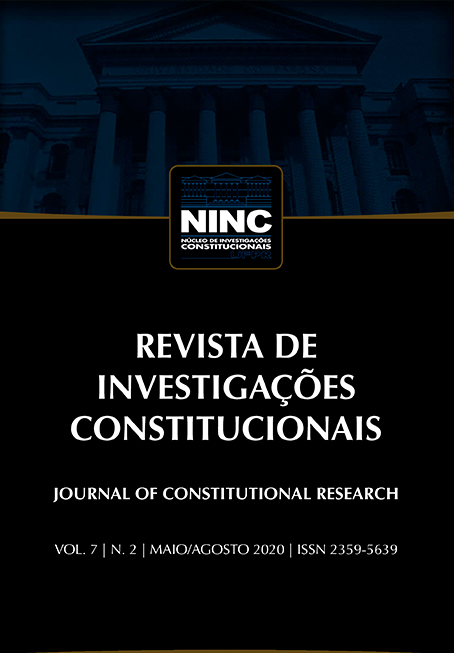Social media, disinformation, and regulation of the electoral process: a study based on 2018 Brazilian election experience
DOI:
https://doi.org/10.5380/rinc.v7i2.71057Palabras clave:
social media, internet governance, media regulation, democracy, electoral process.Resumen
There is global concern about the impact that ‘fake news’ has on democratic decision-making processes. Democratic decision-making needs to be well informed and voters need a minimum of confidence in the information they receive about competitors. The Internet has increased the availability of information, but has allowed new ways of manipulating it to emerge. In recent electoral experiences, social media has increased the impact of misinformation on democracy. These experiences have shown us that Internet governance during the election campaign is an urgent issue. A laissez-faire approach to the electoral process is a threat to democracy because it allows all kinds of cheating. Institutions responsible for ensuring the integrity of elections need to try democratic resources to constrain competitors to behave responsibly. It is important to know the concrete experience of a country that has suffered the attack of disinformation campaigns during an election period, studying the action of the body responsible for organizing this process. This article discusses the guarantee of the electoral process based on the case study of the 2018 Brazilian election.
Citas
ALEMANNO, Alberto et al. Disinformation and propaganda: Impact on the functioning of the Rule of Law in the EU and its Member States. Brussels: European Parliament, Policy Department for Citizens' Rights and Constitutional Affairs, 2019. Available at: <http://www.europarl.europa.eu/RegData/etudes/STUD/2019/608864/IPOL_STU(2019)608864_EN.pdf>. Retrieved July 29, 2019.
BOOTH, Robert et al. Russia used hundreds of fake accounts to tweet about Brexit, data shows. The Guardian, November 14, 2017. World. Available at: <https://www.theguardian.com/world/2017/nov/14/how-400-russia-run-fake-accounts-posted-bogus-brexit-tweets>. Retrieved Feb. 9, 2019.
BRAZIL. Código Eleitoral, Lei n. 4.737. Diário Oficial da União, Brasília, DF, July 15, 1965. Available at: <http://www.planalto.gov.br/ccivil_03/leis/l4737.html>. Retrieved July 7, 2019.
BRAZIL. Lei n. 9.504. Diário Oficial da União, Brasília, DF, September 30 1997. Available at: <http://www.planalto.gov.br/ccivil_03/LEIS/L9504.html>. Retrieved July 7, 2019.
BUNDESVERFASSUNGSGERICHT. Proceedings For the Prohibition of Political Parties. Available at: <https://www.bundesverfassungsgericht.de/EN/Verfahren/Wichtige-Verfahrensarten/Parteiverbotsverfahren/parteiverbotsverfahren_node.html>. Retrieved July 19, 2019.
COMPROVA. Jornalismo colaborativo contra a desinformação. Available at: <http://projetocomprova.com.br>. Retrieved May 22, 2019
ORGANIZATION OF AMERICAN STATES. Preliminary EOM report, Electoral Observation Mission of the Organization of American States, 2018. Available at: <http://www.oas.org/documents/eng/press/Preliminary-Report-EOM-Brasil-2nd-round-ENG.pdf>. Retrieved July 17, 2019.
FIELD, Matthew; WRIGHT, Mike. Russian trolls sent thousands of pro-Leave messages on day of Brexit referendum, Twitter data reveals. The Independent, October 17, 2018. Technology Intelligence. Available at: <https://www.telegraph.co.uk/technology/2018/10/17/russian-iranian-twitter-trolls-sent-10-million-tweets-fake-news/>. Retrieved May 15, 2019.
FREEDOM HOUSE. Freedom in the World 2019. Available at: <https://freedomhouse.org/sites/default/files/Feb2019_FH_FITW_2019_Report_ForWeb-compressed.pdf>. Retrieved July 19, 2019.
FREEDOM HOUSE. Freedom on the Net 2019. Available at: <https://www.freedomonthenet.org/sites/default/files/2019-11/11042019_Report_FH_FOTN_2019_final_Public_Download.pdf>. Retrieved Sep. 20, 2019.
HANSON, Fergus et al. Hacking democracies: Cataloguing cyber-enabled attacks on elections. Barton: ASPI, 2019. Available at: <https://www.aspi.org.au/report/hacking-democracies>. Retrieved May 19, 2019.
HERN, Alex; SAFI, Michael. WhatsApp puts limit on message forwarding to fight fake news. The Guardian, January 21, 2019. Technology. Available at: <https://www.theguardian.com/technology/2019/jan/21/whatsapp-limits-message-forwarding-fight-fake-news>. Retrieved May 17, 2019.
IDEIA BIG DATA. Elections and Fake News. October 2018. Available at: <https://avaazimages.avaaz.org/EN%20IDEIA%20-%20Report%20AVAAZ_v2%203_EN%20version_pdf%20%281%29.pdf>. Retrieved May 17, 2019.
KALSNES, Bente. Fake News. Oxford Research Encyclopedia of Communication. September 2018, Available at: <https://oxfordre.com/communication/view/10.1093/acrefore/9780190228613.001.0001/acrefore-9780190228613-e-809>. Retrieved May 27, 2019.
KEYE, David. The Global Struggle to Govern the Internet. New York: Columbia Global Reports, 2019.
LAZER, David M. J et al. The Science of Fake News. Science, [s.l.]. v.359, issue 6380, p. 1094-1096, March 09, 2018. Available at: <http://science.sciencemag.org/content/359/6380/1094>. Retrieved July 17, 2019.
LONG, Clara. How False News Haunted the Brazilian Elections. Slate, October 30, 2018. Technology. Available at: <https://slate.com/technology/2018/10/brazil-election-fake-news-whatsapp-facebook.html>. Retrieved May 21, 2019.
MELLO, Patricia Campos. Empresários bancam campanha contra o PT pelo WhatsApp. Folha de S. Paulo, October 18, 2018. Poder. Available at: <https://www1.folha.uol.com.br/poder/2018/10/empresarios-bancam-campanha-contra-o-pt-pelo-whatsapp.shtml>. Retrieved July 25, 2019.
NORRIS, Pippa; GRÖMPING, Max. Electoral Integrity Worldwide. Sydney: The Electoral Integrity Project, 2019.
OFFICE OF THE DIRECTOR OF NATIONAL. Background to ‘Assessing Russian Activities and Intentions in Recent US Elections’: The Analytic Process and Cyber Incident Attribution. 2017. Available at: <https://assets.documentcloud.org/documents/3719492/Read-the-declassified-report-on-Russian.pdf>. Retrieved July 20, 2019.
ORTELLADO, Pablo; RIBEIRO, Márcio Moretto. Mapping Brazil’s political polarization online. The conversation, August 3, 2018. Politics/Election ’20. Available at: <https://theconversation.com/mapping-brazils-political-polarization-online-96434>. Retrieved May 7, 2019.
PALMER, Ellis. Spain Catalonia: Did Russian 'fake news' stir things up?, BBC, November 18, 2017. Europe. Available at: <https://www.bbc.com/news/world-europe-41981539>. Retrieved May 17, 2019.
PENNYCOOK, Gordon; RAND, David G Lazy, not biased: Susceptibility to partisan fake news is better explained by lack of reasoning than by motivated reasoning. Cognition, [s.l.], vol. 188, p. 39-50, July 2019. Available at: <https://www.sciencedirect.com/science/article/pii/S001002771830163X>. Retrieved August 12, 2019.
PERON, Isadora; MARTINS, Luisa. TSE nega novo pedido para retirar do ar fake news contra Haddad. Valor, October 10, 2018. Política. Available at: <https://www.valor.com.br/politica/5933037/tse-nega-novo-pedido-para-retirar-do-ar-fake-news-contra-haddad>. Retrieved May 20, 2019.
PRZEWORSKI, Adam. Crises of democracy. Cambridge: Cambridge University Press, 2019.
SABOIA, Fernanda. The Rise of WhatsApp in Brazil Is About More than Just Messaging. Harvard Business Review, April 15, 2016. Available at <https://hbr.org/2016/04/the-rise-of-whatsapp-in-brazil-is-about-more-than-just-messaging>. Retrieved May 7, 2019.
SHAO, Chengcheng et al. The spread of low-credibility content by social bots. Nature communications, vol. 9 (1), 2018. Available at: <https://www.nature.com/articles/s41467-018-06930-7>. Retrieved July 19, 2019.
TARDÁGUILA, Cristina; BENEVENUTO, Fabrício; ORTELLADO, Pablo. Fake News Is Poisoning Brazilian Politics. WhatsApp Can Stop It. The New York Times, October 17, 2018. Opinion. Available at: <https://www.nytimes.com/2018/10/17/opinion/brazil-election-fake-news-whatsapp.html>. Retrieved May 18, 2019.
TUSHNET, Mark. Advanced Introduction to Freedom of Expression. Elgar Advanced Introductions. Cheltenham, UK: Edward Elgar, 2014.
WARDLE, Claire; DERAKHSHAN, Hossein. Toward an interdisciplinary framework for research and policymaking. Strasbourg: Council of Europe, 2017. Available at: <https://rm.coe.int/information-disorder-toward-an-interdisciplinary-framework-for-researc/168076277c>. Retrieved July 3, 2019.
Descargas
Publicado
Cómo citar
Número
Sección
Licencia
Autores que publican en esta revista están de acuerdo con los siguientes términos:
- Autores mantienen los derechos autorales y conceden a la revista el derecho de primera publicación, con el trabajo simultáneamente licenciado bajo la Creative Commons - Atribución 4.0 Internacional que permite compartir el trabajo con reconocimiento de la autoría y publicación inicial en esta revista.
- Autores tienen autorización para asumir contratos adicionales separadamente, para la distribución no exclusiva de la versión del trabajo publicada en esta revista (ej.: publicar en repositorio institucional o como capítulo de libro), con reconocimiento de autoría y publicación inicial en esta revista.
- Autores tienen permiso y son estimulados a publicar y difundir su trabajo online (ej.: en repositorios institucionales o en su página personal) a cualquier punto antes o durante el proceso editorial, ya que esto puede generar alteraciones productivas, así como aumentar el impacto y la citación del trabajo publicado (Véase El Efecto del Acceso Libre).
























